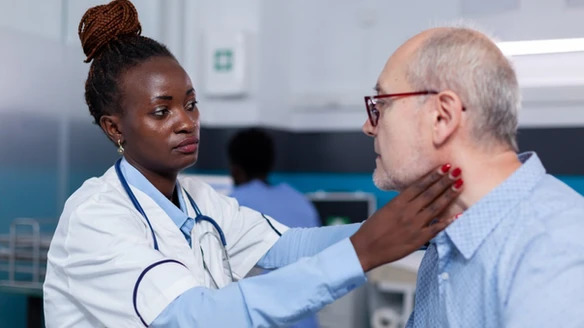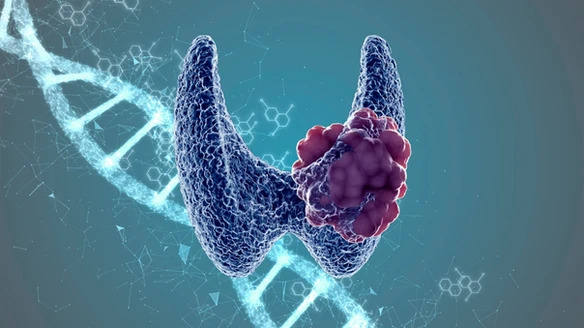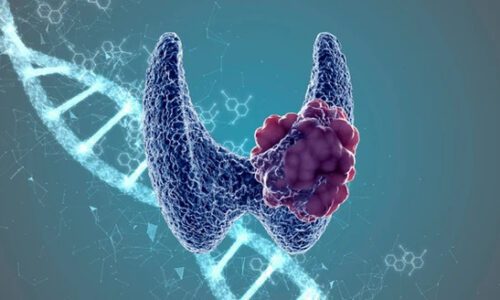- Marcos Santos, Ph.D
- 0 Comments
- 846 Views
A thyroid nodule is a mass of tissue that has grown in the thyroid gland itself or a fluid-filled cyst that has formed in the area. When faced with this problem, the main concern is determining the risk of it being malignant. However, it is known that only a small percentage of thyroid nodules cases represent cancer¹. Let’s understand this statistic.
Thyroid nodules are not always cancer.
According to the Thyroid Department of the Brazilian Society of Endocrinology and Metabolism, thyroid cancer is rare and occurs in approximately 1% of the population. Although it’s three times more common in women, the disease also affects men. The age group at the highest risk is between 25 and 65 years old. Approximately 10% of the adult population has a problem with thyroid nodules, but about 90-95% of them are benign.
Generally, benign nodules do not need to be surgically removed unless they cause symptoms such as choking or difficulty swallowing². However, a thyroid nodule that has been identified as malignant requires a procedure (which is guided in consultation with an endocrinologist and/or head and neck surgeon).
But what happens when the diagnosis from the tests ordered by the doctor indicates an indeterminate nodule? Let’s see the possible alternatives for such cases.
Indeterminate nodule: does it require surgery?
Until recently, the only available option to differentially diagnose a thyroid nodule as malignant or benign was to subject the person to thyroid removal surgery. However, today there are tests that perform molecular analysis and accurately classify the nodule without the need for extreme measures such as undergoing surgery. The mir-THYpe test is indicated only for patients with indeterminate thyroid nodules (Bethesda III or IV). Available throughout Brazil and Latin America, it is a molecular test with solid scientific evidence³ and does not require any additional procedures beyond those requested by the doctor in the initial evaluation, such as Fine Needle Aspiration Biopsy (FNA). This avoids discomfort, does not generate extra costs, and, most importantly, can prevent the risks of unnecessary surgery. Let’s learn more about the procedure.
How is the surgery to remove the thyroid performed?
According to the Oncoguia Institute, surgery is the main treatment when a thyroid nodule is diagnosed as cancer through fine needle aspiration biopsy (FNA). It is also the most common approach in the case of an indeterminate nodule diagnosis. The main types of surgery for thyroid nodule removal are:
- Lobectomy: This surgery is sometimes used for differentiated thyroid cancer (papillary or follicular). The lobe containing the cancer is usually removed along with the isthmus (the part that connects the thyroid lobes). One consequence is that the remaining thyroid tissue can interfere with subsequent tests, such as blood tests for thyroglobulin, thyroid scintigraphy, and tests to diagnose possible recurrences.
- Total Thyroidectomy: This is the most common type of surgery for thyroid removal, including in cases of an indeterminate thyroid nodule diagnosis. If the entire gland is removed, the procedure is called total thyroidectomy and requires the patient to take daily hormonal replacement therapy for life. If only part of the gland is removed, it is called partial thyroidectomy. In this type of surgery, regular follow-up with an endocrinologist is also necessary to check for possible cancer recurrences.
Next, let’s look at some possible complications of total or partial thyroidectomy.
Every surgery carries risks
Experts at the Barretos Cancer Hospital explain that, in general, surgery for thyroid nodule removal progresses well with rare complications. However, it is important to clarify that every surgical procedure involves the risk of complications.
The most important complications, according to doctors, in the case of total or partial thyroid removal, are:
- Hematoma: Despite all efforts to prevent post-operative bleeding, blood accumulation at the surgical site can occur. This condition can cause pain and difficulty breathing. In some cases, it may be necessary to perform another urgent surgery.
- Voice changes: About one in ten patients who undergo surgery for thyroid removal experiences temporary voice changes. In one out of every 250 patients, this effect can progress to permanent changes, such as hoarseness, difficulty reaching high notes, and fatigue while speaking(2). This occurs due to the proximity of the thyroid to the nerves responsible for vocal cord movements.
- Hypocalcemia: Adjacent to the thyroid are the parathyroid glands, which are responsible for producing the hormone PTH, which regulates calcium levels in the blood. After a thyroidectomy, there may be a temporary or permanent decrease in the function of these glands, leading to low blood calcium levels (hypocalcemia). The main symptoms of this condition include tingling in the hands, feet, lips, and ears, which can progress to muscle cramps.
Therefore, it can be said that avoiding unnecessary surgical procedures is always recommended. In the case of an indeterminate diagnosis of a thyroid nodule, it is now possible to rely on artificial intelligence applied to genetic tests for this purpose. Discuss this possibility with your doctor. Want to learn more about mir-THYpe and thyroid-related topics? Check out more posts on our blog!
References:
- Mayo Clinic: https://www.mayoclinic.org/diseases-conditions/thyroid-nodules/symptoms-causes/syc-20355262
- Departamento de Tireoide da Sociedade Brasileira de Endocrinologia e Metabologia: http://www.tireoide.org.br/cancer-de-tireoide/
- Santos MT, Buzolin AL, Gama RR, et al. 2018. Thyroid 28(12): 1618-1626.
- Instituto Oncoguia: http://www.oncoguia.org.br/conteudo/cirurgia-para-cancer-de-tireoide/1886/236/
- Hospital do Câncer de Barretos: https://www.hcancerbarretos.com.br/home-paciente/139-paciente/tipos-de-cancer/cancer-de-tireoide/228-orientacoes-para-cirurgia-de-tireoide








